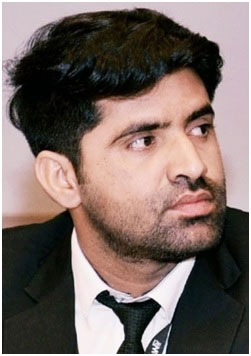A state’s religious minority is often seen as its face in national and international forums, because it shows how tolerant a society is. Pakistan is also a country with many different cultures, languages, and religions, but most of its people are Muslims. The 2017 census, which was done by the Pakistan Bureau of Statistics, showed that 96.47% of Pakistan’s people are Muslims. There are also 2.14% Hindus, 1.27% Christians, 0.09% Ahmadis, 0.01% Sikhs, and 0.01% other people.
I am now a “Field Advocate” for an NGO, where I work on two projects: ADR (Alternative Dispute Resolution) and Minority’s Rights. Under both projects, I have to meet with people from both majority and minority groups to talk about their problems and explain their legal rights and possible solutions based on the Constitution and other State laws.
Before I go on, I want to make it clear that the article is only my opinion. This is based on what I saw when I worked as an advocate for the above projects. Most of the people I’ve met from different minority groups and Muslim groups have been from the poorest part of our society. I think that the most unhappy people in our society are the ones who are poor.
People here tend to think that religious minorities in our country are in trouble, and I used to agree. But after spending a year and a half meeting constantly with different minority groups and the majority Muslim community, I started to think differently.
In my work with both minority and majority communities, I’ve found that they have many of the same issues and problems. For example, both have problems with land encroachment, inheritance disputes, discrimination in services, lack of clean water, lack of health and education facilities, especially in rural areas, sewerage problems, victims of police abuse, victims of bad management in government departments, victims of street crimes, etc.
I don’t see any difference between the problems in these two places. I realised that being left out, not having enough, and being treated badly has nothing to do with religion. Instead, it seems to be a class struggle between those who have and those who don’t.
I talked to a lot of Hindus, and they all said that a so-called “caste system” hurt them in social, political, and economic ways. I also talked to people from the lower and lower-middle class Muslim community. They were also upset about being treated unfairly because of their low social and economic status.
I also talked to the wealthy people in both countries, and they were happy with how things were going. But they were chanting for their own communities to be hurt just to get a lot of people together and use them as scapegoats for political and social gain. So, build a strong relationship with the top people. The wealthy parts of society take advantage of the poor parts of society, no matter what religion they belong to.
Having seen all of this for myself, I’ve come to the conclusion that the conflict isn’t religious but is instead a “Class Conflict.” In fact, the rich take advantage of the poor, the powerful take advantage of the powerless, the Haves take advantage of the Have-nots, the business class takes advantage of the labour class, the landlord robs the farmer, and the employer treats the worker horribly, and all of this happens because of social, political, and economic differences between the two classes, no matter what religion they belong to.
Most importantly, it is the State’s job to get rid of these kinds of activities, attitudes, and actions in our country. Article 37 of the Constitution of the Islamic Republic of Pakistan from 1973, which is called “The Promotion of Social Justice and the Eradication of Social Evils,” says that it is the State’s job to promote the educational and economic interests of backward classes or areas, especially in order to get rid of class differences in the country.
Also, it says that the government should get rid of illiteracy and make sure everyone gets a free, mandatory education so that everyone has the same chances in all areas of life. However, UNICEF says that in Pakistan, 22.8 million children ages 5 to 16 are not in school.
Also, it says that the government must provide technical and professional education. While the status of implementation seems bad, the UNDP says that 64% of Pakistan’s population is under 30 years old, but the country only has 3,798 institutions for technical and vocational education and training. This shows how vulnerable Pakistan is in this area. It also makes sure that the state will provide cheap and quick justice to get rid of all forms of unfairness in the country. Our Honorable Courts, on the other hand, have 2.2 million cases waiting to be heard. Also, it says that the state must make sure that workers have fair and humane conditions of work to stop any kind of exploitation.
Lastly, it is the State’s job to make sure that people from all over the country can take part in all kinds of national activities. This makes for a society that is inclusive and open to everyone.
Sign in
Welcome! Log into your account
Forgot your password? Get help
Password recovery
Recover your password
A password will be e-mailed to you.







